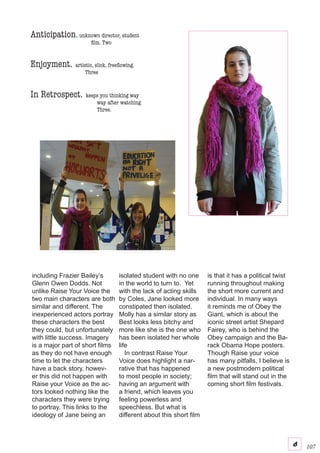Alice hancock magazine
- 1. A girl being persuaded into an action that she does not want to do. This statement rings true with most people who have been pressurised in life. Alice Hancockâs Raise your voice illustrates these pressures and trails of being a teenag- er in modern day. Jane staring aimlessly at the outside world as her âfriendâ Molly walks across the room to confront her in the problems of society. As the narrative unfolds they both have to make a dramatic stand whether to protest for their rights. DIRECTED BY Alice Hancock STARRING Harriet Coles, Lauren Best RELEASED January 28 However this short film fails in its attempts to jux- tapose the serious reality of students fighting for their rights for a respectable ed- ucation, with the tedium of a girl losing her best friend. Thus turning a political film into a dire chick flick. Fur- thermore Raise Your Voice lacks a steady plot, which leaves the audience with many unanswered ques- tions. Jane played by Harriet Coles, is a shy and intelli- gent student. She is pas- sionate about politics but is wary of taking action. Her character reminds the au- dience of Richard Ayoadeâs Oliver Tate in Submarine, who is played by Craig Rob- erts. Both of these charac- ters are outcasts of society and look at this society in an alternative way, leaving them with little friends. In contrast Molly played Lauren Best, is outgoing and adventurous. However these attributes have been portrayed in a way that makes the audience ques- tion Mollyâs motives to take part in this political protest. This role as a protagonist is used in many short films 106 THE THIS IS ENGLAND ISSUE
- 2. including Frazier Baileyâs Glenn Owen Dodds. Not unlike Raise Your Voice the two main characters are both similar and different. The inexperienced actors portray these characters the best they could, but unfortunately with little success. Imagery is a major part of short films as they do not have enough time to let the characters have a back story, howev- er this did not happen with Raise your Voice as the ac- tors looked nothing like the characters they were trying to portray. This links to the ideology of Jane being an Anticipation. unknown director, student film. Two Enjoyment. artistic, slick, freeflowing. Three In Retrospect. keeps you thinking way way after watching. Three. 107 isolated student with no one in the world to turn to. Yet with the lack of acting skills by Coles, Jane looked more constipated then isolated. Molly has a similar story as Best looks less bitchy and more like she is the one who has been isolated her whole life In contrast Raise Your Voice does highlight a nar- rative that has happened to most people in society; having an argument with a friend, which leaves you feeling powerless and speechless. But what is different about this short film is that it has a political twist running throughout making the short more current and individual. In many ways it reminds me of Obey the Giant, which is about the iconic street artist Shepard Fairey, who is behind the Obey campaign and the Ba- rack Obama Hope posters. Though Raise your voice has many pitfalls, I believe is a new postmodern political film that will stand out in the coming short film festivals.


